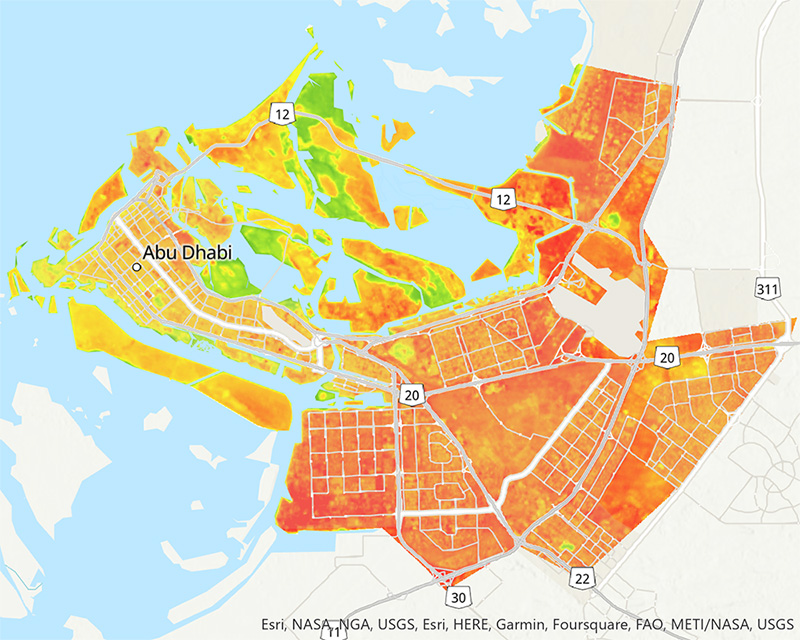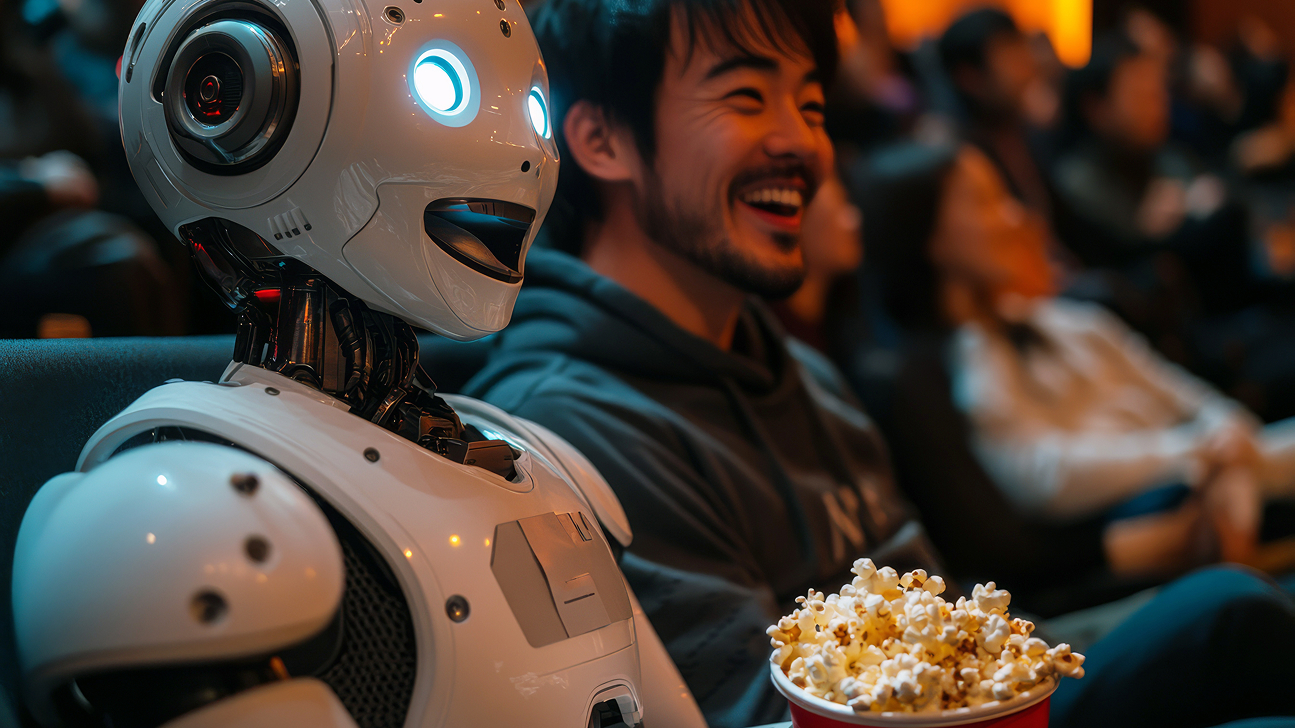Can artificial intelligence help cool our dangerously overheating cities?
Wednesday, November 29, 2023

Speaking at the end of July 2023 as wildfires were devastating large swathes of Greece and Canada, the UN Secretary-General, Antonio Guterres, warned that humanity was in the ‘hot-seat’: “Climate change is here. It is terrifying. And it is just the beginning. The era of global warming has ended; the era of global boiling has arrived. The air is unbreathable. The heat is unbearable.”
But even though parts of the planet were experiencing temperature increases of 4 C (7.2 F) above average, it was across the Eastern Mediterranean and Middle East – a region where temperatures are rising at twice the rate of the global average – that climate change is posing some of the most profound threats to public health.
“Unprecedented and societally disruptive extreme weather events, including heat waves, droughts, dust storms and torrential rains, will soon become a reality unless immediate, ambitious, and transboundary climate action is taken,” said a report from the Max Planck Institute for Chemistry and The Cyprus Institute, in advance of COP27.
IBM-MBZUAI collaboration
[wps_image-right image=”https://staticcdn.mbzuai.ac.ae/mbzuaiwpprd01/2022/06/Fahad-Khan-secondary.jpg” caption=” Dr. Fahad Khan” first-paragraph=”It was with these seemingly intractable challenges in mind, as well as the forthcoming COP28 UAE, which will be held at the Expo City in Dubai from November 30 until December 12, 2023, that the US technology giant, IBM, and the Mohamed bin Zayed University of Artificial Intelligence (MBZUAI) in Abu Dhabi, the world’s first research-based university dedicated to AI, joined forces in January 2023 to establish an AI Center of Excellence to help drive sustainability across the region.” second-paragraph=” “The only way to Net Zero is through disruptive technologies and innovations that fundamentally re-program our energy production and consumption — harnessing big data to help drive more effective decision making and problem solving,” said H.E. Dr. Sultan Al Jaber, Minister of Industry and Advanced Technology, President-Designate for COP28, and Chairman of MBZUAI.”]
“IBM’s collaboration with MBZUAI will leverage AI to address some of the most pressing issues of our time including sustainability and net zero strategies,” added Arvind Krishna, IBM Chairman and CEO.
The urban heat island effect
One of the ways in which the Center hopes to inspire meaningful action is by monitoring, modeling, and visualizing climate change more effectively to provide decision-makers with more precise data that can be used to inform and accelerate decision-making, especially when it comes to an extremely serious form of climate change known as the urban heat island effect (UHI).

Map of Abu Dhabi land surface temperatures
This research is being led by Dr. Fahad Khan, Deputy Department Chair and Professor of Computer Vision at MBZUAI, his colleague Dr. Salman Khan, Associate Professor of Computer Vision at MBZUAI, and Dr. Levente Klein, a research staff member in the Artificial Intelligence department at IBM.
“Our goal is to develop foundation models that are generic and applicable to the entire planet but also to produce solutions for the UAE and Middle East, which are particularly affected by climate change,” explained Dr. Fahad Khan.
[wps_image-left image=”https://staticcdn.mbzuai.ac.ae/mbzuaiwpprd01/2022/06/Salman-Khan-secondary.jpg” caption=”Dr. Salman Khan” first-paragraph=” A localised form of climate change, the UHI occurs in densely developed areas where impermeable materials such as concrete and asphalt can absorb as much as 80-95% of the sun’s electromagnetic radiation before radiating it back into the atmosphere, thus increasing local surface and air temperatures and exacerbating global warming. As a result, urban surfaces such as roads and roofs stay hotter for longer, increasing the demand for energy-sapping air conditioning at peak hours long after temperatures in more rural areas have started to decrease.” second-paragraph=” “]
Soaring heat-related deaths
Not only do soaring urban temperatures place an unsustainable strain on energy grids, but they are also proving to be increasingly deadly. In July 2022, for example, 11,637 people died in Europe from heat-related causes in a single week while average annual heat-related deaths in the US are reported to have increased by 95% between 2010 to 2022. Furthermore, it is predicted that urban populations will more than double in size by 2050, by which time 70% of the global population will be city-dwellers.
The Cool Cities Network, which focuses on opportunities for cities to reap the economic, energy, health, environmental, and social benefits of reducing risks posed by heat waves and urban heat island effect, predicts that the number of cities exposed to extreme temperatures will nearly triple over the next decades and that more than 970 cities will experience average summertime temperature highs of 35˚C (95°F) by 2050.
City authorities have used various strategies to combat the UHI, most notably by increasing the ‘albedo’ of urban surfaces such as roofs and roads to increase the amount of solar energy they can reflect. Increasing the amount of urban vegetation can also help mitigate the UHI, as plants provide shade while reflecting light and heat and reduce temperatures through a natural evaporative cooling process called transpiration. Research has shown, however, that the impact of urban vegetation is highly variable and contingent on a city’s latitude, density, design, and local land use patterns.
Modelling with satellite data
The IBM/MBZUAI team is using the analysis of fine-resolution thermal satellite data to help create a foundation model that is not only capable of identifying and mapping specific types of vegetation but of mapping and modelling the impact of the UHI in a particular place at a given time and even calculating the embodied carbon in specific tree and plant species and how this varies annually.
“To do this we’re leveraging publicly available, open-source data as well as collecting our own, high-quality data that is specific to the UAE that will enable us to identify land-use on a building-by-building basis,” said Dr. Salman Khan.
Unlike AI models designed and trained with a specific task in mind, such as generating text, images, or code, Foundation Models are flexible AI systems trained on large amounts of Internet data to perform a potentially endless variety of tasks.
[wps_pull-out-quotes-left content=”Our goal is to develop foundation models that are generic and applicable to the entire planet but also to produce solutions for the UAE and Middle East, which are particularly affected by climate change.” surname=”Dr. Fahad Khan” source=”Deputy Department Chair and Professor of Computer Vision at MBZUAI”][/wps_pull-out-quotes-left]
But as IBM’s Levente Klein explains, when trying to achieve this level of complexity, foundation models need to learn from source data that is equally sophisticated. That means creating a model that is able to recognise and identify individual tree species so their height, speed of growth, and longevity can be taken into account, especially when city authorities are trying to prepare future planting strategies, to mitigate widespread tree mortality associated with drought or disease, or to calculate the efficacy of their attempts to combat the UHI while reducing their carbon footprint.
“Ideally, we want to help reduce emissions,” said Klein. “But if we can use AI and satellite imagery to quantify the growth in a city’s vegetation and calculate the amount of carbon that is being sequestered [each year], that could also be used to offset emissions.”
The aim is to harness big data to help drive more effective and efficient decision-making when tackling the climate crisis, but the research also points to the need for increasingly sophisticated ways of understanding and quantifying the role and value of nature and living systems, something that AI is ideally positioned to communicate.
- partnerships ,
- research ,
- sustainability ,
- climate change ,
- COP28 ,
- IBM ,
Related
MBZUAI and Minerva Humanoids announce strategic research partnership to advance humanoid robotics for applications in the energy sector
The partnership will facilitate the development of next-generation humanoid robotics tailored for safety-critical industrial operations.
Read MoreAI and the silver screen: how cinema has imagined intelligent machines
Movies have given audiences countless visions of how artificial intelligence might affect our lives. Here are some.....
- AI ,
- cinema ,
- art ,
- fiction ,
- science fiction ,
- artificial intelligence ,
Special delivery: a new, realistic measure of vehicle routing algorithms
A new benchmark by researchers at MBZUAI simulates the unpredictable nature of delivery in cities, helping logistics.....
- delivery ,
- logistics ,
- machine learning ,
- research ,
- computer vision ,
- conference ,
- neurips ,
- benchmark ,


